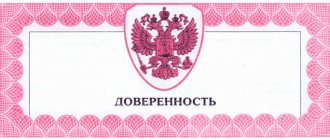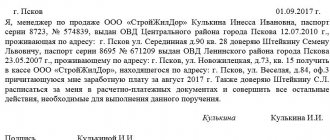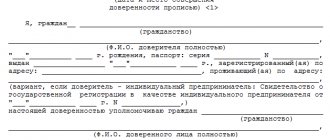Registration of a power of attorney to receive goods and materials
Powers of attorney to receive goods, regardless of whose name they are drawn up, have the usual written form that does not require notarization.
For example, a power of attorney for receiving goods or goods and materials issued on behalf of an individual is drawn up in free form and certified only by the personal signature of the principal. This document, in accordance with Article 185 of the Civil Code of the Russian Federation, can be issued either directly to a third party who will ship (delivery, etc.) of the goods, or to a representative for presentation at the place of demand.
Powers of attorney from legal entities are usually drawn up, in accordance with Resolution of the State Statistics Committee of Russia No. 71a of October 30, 1997, according to unified forms M-2 and M-2a. We'll talk more about these forms later. In addition to unified forms, legal entities can also use their usual form of powers of attorney - provided that all the necessary details are indicated - this does not contradict the law.
It should be said that a power of attorney to receive goods and materials must necessarily contain an indication of specific goods or other valuables indicating their quantity that the authorized person is supposed to receive. If goods are received according to an invoice, specification for a contract or other document containing a complete list of those goods to be received, it is permissible not to list all the values to be received in the power of attorney itself. But in this case, it must contain an indication of such a document.
It is also important to note that, regardless of the form in which the power of attorney to receive goods is drawn up (free or unified), a mandatory condition for the validity of the power of attorney is to indicate the date of its preparation. If this requirement is not fulfilled, the power of attorney is considered void - and therefore does not entail the rights or obligations of the parties.
What changed
Firstly, the three-year validity period of the power of attorney has been cancelled. Now it can be issued for any period. In this case, the validity period must be indicated in the power of attorney. Since, in the absence of an indication of the validity period, the power of attorney will remain valid only for a year from the date of its issue (clause 1 of Article 186 of the Civil Code of the Russian Federation).
Secondly, legal entities are no longer required to certify a power of attorney with a seal, since the signature of the head of the organization is sufficient for certification (Clause 4 of Article 185.1 of the Civil Code of the Russian Federation).
Thirdly, the rule on mandatory notarization of powers of attorney, which are issued in the order of delegation by legal entities, heads of branches and representative offices of organizations (clause 3 of Article 187 of the Civil Code of the Russian Federation), has been abolished.
Fourthly, in addition to the power of attorney, which the principal has the right to revoke at any time, it is now possible to issue an irrevocable power of attorney (Article 188.1 of the Civil Code of the Russian Federation), which has some features:
- issued only by legal entities or entrepreneurs;
- the power of attorney states that it is irrevocable;
- always certified by a notary;
- It is impossible to make a transfer of trust, unless otherwise provided in the power of attorney.
The issuance of such a power of attorney does not mean that it cannot be revoked. Thus, the power of attorney itself can list the reasons for its cancellation. An irrevocable power of attorney can also be canceled after the termination of the obligation for the fulfillment of which it was issued or in the event of a representative’s abuse of his powers (circumstances arise indicating that such abuse is possible in the future).
Power of attorney form for receiving goods from a legal entity in Word
An enterprise can develop its own form of power of attorney to receive goods.
Typically, a document is developed using Microsoft Word. When issuing a power of attorney on the letterhead of a legal entity, information about the organization (OGRN, INN, legal address), the name of the manager or other person authorized to issue powers of attorney, and the name of the document on the basis of which the latter acts is indicated. Next, the personal data of the representative must be indicated: last name, first name, patronymic, date of birth, details of the identity document, address of residence. Then the order should be described in detail, indicating the list of goods to be received, and the rights of the representative, indicating the right to sign delivery notes or other documents that accompany the acceptance of the goods.
What types of powers of attorney are there?
It is immediately necessary to make a reservation that civil legislation does not in any way divide powers of attorney into types; it only establishes the possibility of indicating in the power of attorney the range of powers of the representative.
However, lawyers distinguish several types of power of attorney, based on practice.
General power of attorney
It gives the representative the maximum package of powers without being tied to a specific task. The attorney has almost complete freedom of action.
Such a document can only be signed by the head of the principal legal entity, and the organization’s seal (if any) must be affixed to the form of the document. Also, such a power of attorney can be certified by a notary, but you will not find the concept of “general power of attorney” in the Law. Previously, the term “general power of attorney” could be found in the Methodological Recommendations for Certifying Powers of Attorney of the Chamber of Notaries, but these recommendations were abolished in 2015. In modern notary regulations, general powers of attorney are not found. This does not change the prevalence of this type of power of attorney in practice.
A power of attorney usually contains text with the following content:
“I trust (the attorney) to manage and dispose of all my property, whatever it may be and wherever it is located, as well as to enter into all transactions permitted by law for the management and disposal of property; accept or refuse an inheritance; receive property, money (deposits), securities, as well as documents due to me from all persons, institutions, enterprises, organizations, including from branches of banks of the Russian Federation, post offices and telegraph offices for all reasons; manage accounts in banks of the Russian Federation; receive postal, telegraph and other correspondence of all kinds, including money and parcels; conduct business on my behalf in all government agencies, cooperative and public organizations, as well as conduct my affairs in all judicial institutions.”
As you can see, a general power of attorney gives the representative almost unlimited powers. Such a power of attorney should be drawn up only when there is an inevitable need to vest one person with the authority to carry out all transactions and represent the interests of a legal entity in all government agencies and non-governmental organizations. There is a risk that the representative will use an unlimited power of attorney against the interests of the principal, and transactions made by the representative under the power of attorney may be challenged in court. If the attorney does not need to transfer all powers, then it is better to issue a special or one-time power of attorney.
Special power of attorney
It gives the representative the right to repeatedly perform certain actions of the same type. Such a power of attorney is most often issued to employees for the duration of their work function, which is associated with representing the interests of the organization in specific aspects. For example, a seller may be entrusted with the right to conclude transactions, and a lawyer may be entrusted with representing the interests of the organization in all courts and regulatory authorities.
Example of wording in a special power of attorney for a company lawyer:
“Limited Liability Company “Test” authorizes (attorney details) to represent on behalf of LLC “Test” in all courts of the Russian Federation, including arbitration, federal courts of general jurisdiction and magistrates, to perform all procedural actions provided for by current legislation ...; receive any documentation with the right to sign all necessary documents and perform all actions necessary to exercise the powers provided for by this power of attorney.”
A special power of attorney can be issued for either a short period or several years.
One-time power of attorney
Such a power of attorney is drawn up when the attorney is required to perform only one action in the near future. The validity period of such powers of attorney is usually no more than a month, so that the employee completes the assignment on time and does not use the power of attorney for other purposes. A one-time power of attorney may be required if you need to direct an employee to a one-time, unusual assignment.
For example, a company may ask a trainee to pick up a letter from the post office by issuing him a one-time power of attorney indicating a specific post office and postal item. When the internship period ends, the power of attorney will no longer be valid.
Execution of a power of attorney to receive goods and materials from an individual
In essence, powers of attorney for receiving goods and materials from legal entities and individuals are almost identical.
The only difference is in the person who certifies the power of attorney and the information about the principal that must be indicated in the document. We listed the data that is reflected in the form of a power of attorney to receive goods from a legal entity above. When issuing a power of attorney by an individual, its content remains the same, and information about the principal must contain his last name, first name and patronymic, date of birth, as well as information about the identity document (number and series, date of issue, name of the issuing authority and department code) and place of residence. If a citizen is registered as an individual entrepreneur, his TIN should be indicated; In addition, in this situation, the power of attorney is certified by the seal of the individual entrepreneur (if available).
Registration procedure
If it is planned to transfer certain rights and powers to a specific person, then the trustee must decide whether the power of attorney needs to be certified by a notary. If the services of a specialist are required, then the following actions are performed:
- it is determined what powers will be transferred to the trustee;
- the necessary documents are prepared;
- the text of the power of attorney is drawn up;
- The documentation is examined by a notary, after which he certifies the text.
Only after completing this process can you use the resulting documentation for various purposes. It confirms that the trustee can represent the interests of another person or even a company.
Power of attorney to receive goods in free form
A power of attorney from an individual to receive goods can also be drawn up in free form (simple written form). However, even if you refuse a unified power of attorney, you must indicate the following information in it:
- Document's name.
- The date of drawing up the power of attorney - otherwise the document will be considered void.
- FULL NAME. the person writing the power of attorney and full name. the person receiving this authority; information about your identity document and place of residence.
- Information about the product received - name, contract information.
- Signatures of the persons specified in the power of attorney.
A free power of attorney can be printed or handwritten. There is no need to have it specially certified by a notary.
What documents are required?
Before a power of attorney is certified by a notary, the principal must prepare certain documentation. The composition of the package of documents depends on the status of the person.
The procedure is a one-sided transaction, so only the presence of the principal is sufficient. He submits the following documentation to the notary:
- passport;
- if a document is drawn up to register various property transactions, then title papers for the property are additionally required;
- if the principal is a company, then constituent documentation, a certificate of registration and registration, as well as various licenses or other mandatory papers are prepared;
- directly a power of attorney, which can be drawn up by the principal or a selected notary.
The specialist may request additional papers, which depend on what information is entered into this document. A package of documents is prepared independently by the principal or a hired lawyer. Only on the basis of these papers can a power of attorney be properly certified by a notary. The documents must contain only reliable information, since if it is discovered that they are counterfeit, the power of attorney will be revoked.
When it is impossible to use the services of a notary
The legislation provides for some situations in which it is impossible to notarize a power of attorney. These include:
- the citizen is a military man, and is also located in a military medical organization or other area where there is no properly registered notary office;
- the participant in the process is a minor citizen who has not received appropriate permission from his parents or guardians;
- the participant in such relations is an incapacitated person.
It is not uncommon for citizens to be in areas where a notary does not officially work. In this case, another person with the necessary authority can certify the documentation.
What information is included in the document?
A power of attorney may contain different information, since the text depends on what powers are transferred under this document. A general power of attorney, certified by a notary, allows the authorized person to perform almost all actions on behalf of the principal.
When compiling this document, the following data is entered:
- date of documentation generation;
- information about the principal and the authorized person;
- a list of powers transferred by the originator to another person;
- signature of the principal;
- seal of the organization, if the compiler is a company;
- seal of the selected notary.
The most important point of this document is its validity period. The term is determined only by the parties to the transaction, after which it is certified by a notary. If there is no information about how long the power of attorney is valid, then by law it can only be used for one year.
Who can certify a power of attorney other than a notary?
Often in small towns there is no notary, but the need for his services arises quite often. In this case, it is allowed to draw up many types of powers of attorney without inviting this specialist.
If notarization is required by law, the procedure can be performed by other persons with the necessary authority. These include:
- the chief physician of the medical organization where the client is being treated;
- the captain of the ship on which the applicant is located;
- head of the social protection department of any region;
- the head of the military unit in which the citizen who wishes to draw up a document serves;
- the head of the prison, if the principal is in prison, and the need for notary services is determined by the requirements of the law, and not by the personal initiative of the citizen.
If documentation is actually being drawn up that requires notarization, then the above persons can perform the process for this specialist. Properly drawn up powers of attorney have legal force and can therefore be used for any purpose.
If a power of attorney regarding salary is issued, it can be certified by the employer. If documentation is being prepared for receiving a scholarship, the notary can be replaced by the rector of the educational institution. If a trustee is given the right to open or manage a deposit in a bank, then the procedure for drawing up a power of attorney can be carried out with the participation of the manager of this institution.
Regardless of who performs this process, it is required to put the company seal on the document, as well as the signature of the certifying person directly.






